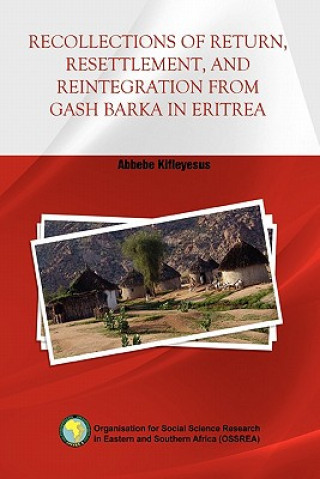
Code: 09019856
Recollections of Return, Resettlement, and Reintegration from Gash Barka in Eritrea
by Abbebe Kifleyesus
At the beginning of the 1990s, the end of the Eritrea-Ethiopia war resulted in the repatriation of some 70,000 Eritreans from the Sudan. It soon became clear that the movement of such a huge influx of refugees had its own momentum ... more
- Language:
 English
English - Binding: Paperback
- Number of pages: 302
Publisher: OSSREA, 2010
- More about this

You might also like
-

Dune
35.33 zł -33 % -

Haunting Adeline
125.29 zł -2 % -

Berserk Deluxe Volume 2
214.34 zł -1 % -

White Nights
15.53 zł -23 % -

Powerless
44.77 zł -19 % -

Atomic Habits
80.31 zł -19 % -

Dune Messiah
46.70 zł -3 % -

Berserk Deluxe Volume 3
221.96 zł -

One Day
32.89 zł -36 % -

Berserk Deluxe Volume 1
213.53 zł -2 % -

Iron Flame
61.62 zł -28 % -

Surrounded by Idiots
51.57 zł -19 % -

Harry Potter and the Prisoner of Azkaban (Minalima Edition)
171.80 zł -2 % -

Gravity Falls Journal 3
89.75 zł -1 % -

Heaven Official's Blessing: Tian Guan Ci Fu (Novel) Vol. 1
89.75 zł -1 % -

The Creative Act
101.02 zł -15 % -

Dune
38.37 zł -38 % -

Hunting Adeline
131.18 zł -1 % -

A Little Life
48.93 zł -12 % -

Children of Dune
47.11 zł -2 % -

Heaven Official's Blessing: Tian Guan Ci Fu (Novel) Vol. 2
96.55 zł
Availability alert
Enter your e-mail address and once book will be available,
we will send you a message. It's that simple.
More about Recollections of Return, Resettlement, and Reintegration from Gash Barka in Eritrea
 Book synopsis
Book synopsis
At the beginning of the 1990s, the end of the Eritrea-Ethiopia war resulted in the repatriation of some 70,000 Eritreans from the Sudan. It soon became clear that the movement of such a huge influx of refugees had its own momentum. This momentum engendered closer academic research. Along with the initial enthusiasm for a nation, there were also high hopes amongst many academics and policymakers that Eritrean refugee cycles might come to an end for many. These hopes for a conducive environment for repatriation of Eritrean refugees appear to be well-founded because between 1990 and 1998, more than 350,000 refugees were repatriated to their country where policies to assist repatriation have been linked to attempts to support economic reconstruction, although not always successfully. The increased and accelerated rates of repatriation from the Sudan lend legitimacy to the discourse that repatriation is the optimum, most durable and feasible solution to the refugee crisis from Eritrea. Yet, there was the need to understand the priorities of the refugees in exile, for some of whom repatriation may not have been a desired outcome and for whom 'home' has come to mean something quite different from the meaning often ascribed by policymakers. Even where return has occurred, there was a need to pay much closer attention to relations after return, and to recognise that even if repatriation is the end of one cycle, it is also usually the start of a new cycle which can challenge and expose some returnees to vulnerability. This study addresses repatriation and reintegration and how they affect both the stayee communities to which refugees are repatriated as well as the returnees themselves. Of particular importance to this study is what connects or reconnects Eritrean refugees to their communities of origin in Gash Barka as they contemplated a possible or actual repatriation. Also significant are the social, economic, psycho-social and ecological conditions necessary for Eritrean refugees to decide to repatriate voluntarily or coercively or still to accept an assisted repatriation and when and on what basis they then decide to be repatriated. The study also considers what happens during resettlement and reintegration, not only to returnees but also to stayee societies in Gash Barka, and examines whether the notion that culture is rooted in particular geographic places implies that uprooted Eritrean refugees somehow have lost their culture.
 Book details
Book details
Book category Books in English Society & social sciences Society & culture: general Social issues & processes
- Full title: Recollections of Return, Resettlement, and Reintegration from Gash Barka in Eritrea
- Author: Abbebe Kifleyesus
- Language:
 English
English - Binding: Paperback
- Number of pages: 302
- EAN: 9789994455508
- ISBN: 9789994455508
- ID: 09019856
- Publisher: OSSREA
- Weight: 486 g
- Dimensions: 229 × 154 × 20 mm
- Date of publishing: 01. December 2010
safisfied customers
Since 2008, we have served long line of book lovers, but each of them was always on the first place.
Copyright! ©2008-24 libristo.pl All rights reservedPrivacyPoučení o cookies



 21 million books
21 million books Delivery 12.99 zł
Delivery 12.99 zł (32) 444 93 66 (8-15.30h)
(32) 444 93 66 (8-15.30h)